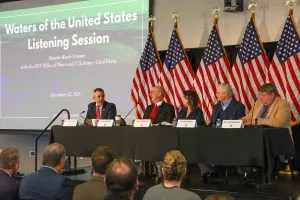
House Majority Leader Mike Lefor, R-Dickinson, center, participates in the special session of the Legislature on Oct. 23, 2023, which was required after a ruling from the state Supreme Court. (Kyle Martin/For the North Dakota Monitor)
(Mary Steurer – North Dakota Monitor) – This legislative session, lawmakers will no longer have access to a loophole for 11th-hour policy changes.
Historically, the budget bill for the Office of Management and Budget was lawmakers’ last chance to approve new funding requests, to revive defeated bills or to fix typos in existing laws.
Since the bill is traditionally the last bill to pass, legislators would treat it as a vehicle for other unrelated legislation. It was sometimes called a “Christmas tree” bill because it received so many miscellaneous amendments.
But the North Dakota Supreme Court in 2023 declared the practice unconstitutional.
Lawmakers will have to find a new approach for the upcoming session, which starts Tuesday.
“We don’t have a particular process worked out, but we’ll certainly be aware that they can’t put non-related things into the OMB bill,” Legislative Council Director John Bjornson said.

The Supreme Court ruling resulted from a legal challenge to the 2023 OMB bill brought by the North Dakota Public Employee Retirement System board.
The 2023 OMB bill included amendments to increase the number of board members from nine to 11, and to grow the number appointed by the Legislature from two to four. Lawmakers had originally brought those changes as an individual bill, but the measure failed.
Other provisions in the 2023 OMB bill included topics as wide-ranging as school funding, public infrastructure, business grants and drug regulations. It was the last bill of the session to pass, clearing its final vote at roughly 3 a.m. on a weekend, The Associated Press reported.
Under the state constitution, bills are only supposed to about one thing. It states that “no bill may embrace more than one subject, which must be expressed in its title” — a clause commonly referred to as the single subject rule. The provision is intended to prevent lawmakers from using bills with majority support as vehicles to pass unrelated, less popular policies.
The PERS board filed suit against the Legislature, arguing in part that the OMB bill violated the single subject rule.









